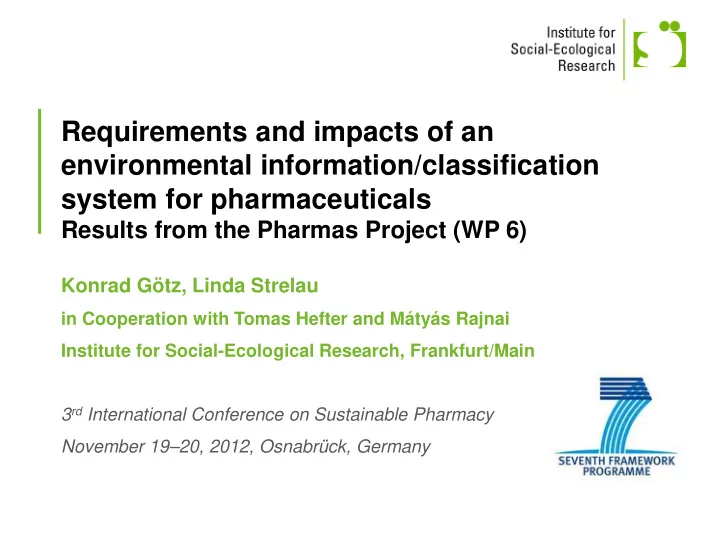

Requirements and impacts of an environmental information/classification system for pharmaceuticals Results from the Pharmas Project (WP 6) Konrad Götz, Linda Strelau in Cooperation with Tomas Hefter and Mátyás Rajnai Institute for Social-Ecological Research, Frankfurt/Main 3 rd International Conference on Sustainable Pharmacy November 19–20, 2012, Osnabrück, Germany
Context The presented results are based on WP 6 of the Pharmas-Project • • http://www.pharmas-eu.org/ • Project Coordinator: John Sumpter john.sumpter@brunel.ac.uk Scientific Coordinator: Benoit Roig benoit.roig@ehesp.fr • • Leader WP6: John Munthe john.munthe@ivl.se WP 6 Cooperation with: Rodrigo Vidaurre • rodrigo.vidaurre@ecologic.eu 3rd International Conference on Sustainable Pharmacy, Osnabrück 2
Aim and content of the survey Survey on experts’ opinion on acceptance and possible impacts of an environmental classification system for pharmaceuticals Topics: Risk perception Assumed effectiveness compared to other measures Expected use among different stakeholders Projected possible reductions of pharmaceutical residues in the water Framework conditions considered necessary Expected contribution to problem awareness Expected impacts on the pharmaceutical industry Opinion on whether a classification system should be introduced in the EU 3rd International Conference on Sustainable Pharmacy, Osnabrück 3
Method Delphi-Survey with two rounds Participants Germany Hungary United Total Kingdom 1 st round 90 51 45 186 2 nd round 62 35 18 115 Respondents from relevant stakeholder groups: doctors, pharmacists and patient organisations water management authorities pharmaceutical industry environmental NGOs health insurance science 3rd International Conference on Sustainable Pharmacy, Osnabrück 4
To what extent do you agree with these statements on pharmaceutical residues in the environment? 1 st round (tend to agree + totally agree) 92% Pharmaceutical residues in the environment 94% constitute an ecological risk 78% 72% Pharmaceutical residues in the environment 92% constitute a human health risk 44% 91% Antibiotic residues in the environment 92% constitute an ecological risk 67% 86% Antibiotic residues in the environment 90% constitute a human health risk 76% 87% Cytostatic residues in the environment 94% constitute an ecological risk 71% 71% Cytostatic residues in the environment 94% constitute a human health risk 47% Germany (N=90) Hungary (N=51) United Kingdom (N=35) 3rd International Conference on Sustainable Pharmacy, Osnabrück 5
How many doctors would use such an environmental classification system for pharmaceuticals... (average estimation) 17% 23% …if use was voluntary 14% …if use was voluntary and at the same time the 36% 48% environmental classification system was part of basic and continuing medical training 35% 41% ...if use was voluntary and the environmental 51% classification system was integrated into 36% common prescription software ...if use was voluntary and there were 44% incentives for environmentally friendly 59% 41% prescription behaviour Germany (N=90) Hungary (N=51) United Kingdom(N=45) 3rd International Conference on Sustainable Pharmacy, Osnabrück 6
By what percentage do you think pharmaceutical residues in the water could be reduced if the most environmentally friendly pharmaceutical was prescribed/chosen each time? (average estimation) 28% 45% Pharmaceuticals in general 23% 29% 47% Prescription drugs 27% 27% 41% Non-prescription drugs 24% 29% 50% Antibiotics 25% 24% 48% Cytostatics 23% Germany 2nd round (N=61) Hungary (N=51) United Kingdom(N=45) 3rd International Conference on Sustainable Pharmacy, Osnabrück 7
Please choose from the following list those three of the eight measures suggested, which in your opinion contribute most effectively to reducing pharmaceutical residues in the environment. 1 st round Germany (N=90) Hungary (N=51) United Kingdom (N=45) Disposal of unused Water treatment 52% Public awareness 65% 64% pharmaceuticals Development of Disposal of unused 52% environmentally friendly 55% Public awareness 49% pharmaceuticals pharmaceuticals Development of Disposal of unused Public awareness 51% 49% environmentally friendly 49% pharmaceuticals pharmaceuticals An environmental classification system for Non-medical treatment 37% 41% Water treatment 47% pharmaceuticals and prevention Development of An environmental environmentally friendly 37% Water treatment 37% classification system for 29% pharmaceuticals pharmaceuticals An environmental Non-medical treatment Education and training for 33% classification system for 29% 27% and prevention doctors and pharmacists pharmaceuticals Education and training for Education and training for Non-medical treatment 27% 14% 27% doctors and pharmacists doctors and pharmacists and prevention An ecolabel for An ecolabel for An ecolabel for environmentally friendly 11% environmentally friendly 10% environmentally friendly 9% pharmaceuticals pharmaceuticals pharmaceuticals 3rd International Conference on Sustainable Pharmacy, Osnabrück 8
In your opinion, should such an environmental classification system for pharmaceuticals be introduced in the EU? 1 st round Germany Hungary No 6% Yes Yes 94% 100% N=90 N=51 United Kingdom No 13% Yes 84% N=45 3rd International Conference on Sustainable Pharmacy, Osnabrück 9
Conclusion The majority of experts agrees that pharmaceuticals in the environment are a ecological problem Respondents expect a high acceptance of the system if it is integrated into a good framework of training, software and incentives If there would be a change of prescription behavior they expect significant reduction of pharmaceuticals in the environment Minimum: 23% If the expert have to make a Choice – Environmental Classification System for pharmaceuticals would not be top priority – other approaches are considered more important Nevertheless there is broad agreement to the introduction of the classification system 3rd International Conference on Sustainable Pharmacy, Osnabrück 10
Recommend
More recommend